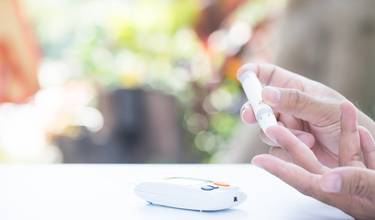Since the discovery of insulin in 1921, people suffering from diabetes can live normal lives without severe symptoms and complications. Insulin has made it possible for diabetics to live longer. But along with prolonged lifetime came unwanted sequelae, affecting the eyes of the patients. This diabetes-related eye disease was first identified by Dr. Elliot P. Joslin from the Joslin Diabetes Center in Poston. He noticed that his diabetic patients developed a severe vascular disease over time, affecting their eyes. The condition is known as diabetic retinopathy.
Retinopathy is a disease affecting the blood vessels around the eyes leading to decreased vision - and in worst case to total blindness. Blindness occurs to people suffering from untreated diabetes for about 20-30 years. Diabetic retinopathy can be caused by edema in the eye, fragile and leaky blood vessels or blood vessels that spontaneously grow across the retina. These conditions can lead to blockage of the visual center of the eyes, resulting in blurred vision and ultimately complete blindness.
For some diabetics, the disease progresses so quickly that the affected person does not notice the symptoms before it is too late. The risk of developing this disabling disease can be reduced, if the patient regularly visits a specialist in diabetic retinopathy (ophthalmologist). New eye examination technology can detect early signs of diabetic retinopathy, making it possible to prevent the disease before it causes irreversible damage.
The physiology of the eye
The eye is a very sensitive organ, constructed by networks of blood vessels and light sensors, which transform light into visible images. The light travels through the lens and into the retina, via the visual nerve, into the visual center in the brain. If only one of the elements of this visual process is defect or out of balance, the vision of the affected individual is decreased.
Diabetic retinopathy damages the blood vessels in the retina of the eyes. The complications develop after a long period of dysregulated high blood sugar. The high level of blood sugar causes destruction of the small vessels, that provides the eye with nutrition and oxygen. This provokes a response, leading to the formation of new vessels as a compensation to the damaged and dysfunctional small vessels. These new vessels form an unorganized network, that in worst case can detach the retina from the back of the eye – resulting in blindness.
What can I do to prevent diabetic retinopathy?
You can prevent diabetic retinopathy by keeping your eyes healthy by controlling your blood sugar levels, and regularly visit an eye specialist. The high blood sugar has a huge impact on the development of diabetic retinopathy, since it causes damage to the small vessels in the eyes. Even though you haven’t noticed any symptoms of the disease, you should see an ophthalmologist frequently.
Nevertheless, there are good news regarding treatment of diabetic retinopathy: The earlier you spot signs of diabetic retinopathy, the easier it can be treated and prevented. One of the treatment against retinopathy is laser. Laser can prevent leaking of the damaged blood vessels in the retina as well as stop the progression of the disease. A new method is treatment with anti-VEGF-injections. These injections have shown to not only stop the progression of ongoing retinopathy, but also to improve vision of the affected individuals (1).








